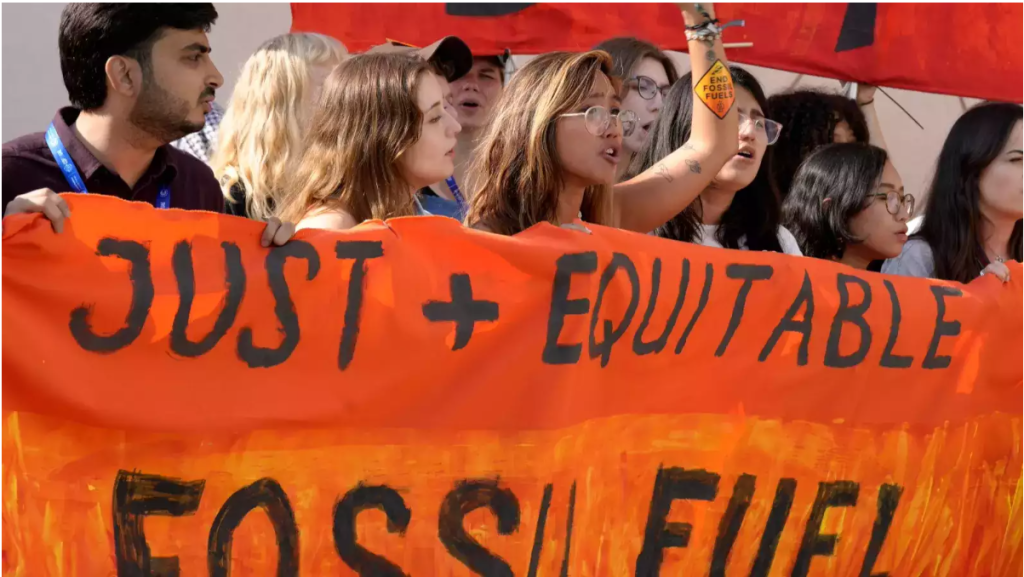Climate summits are occasions for massive hypocrisy. COP28 in Dubai has just ended with a vague commitment to transition out of fossil fuels, without addressing the issue of climate justice.
Climate activists have castigated the UAE for having the gall to host a climate summit while being a leading producer of the very fossil fuels they seek to ban. The Guardian and other media have accused the UAE of “greenwashing” — using vague statements and public relations tricks to cover its plans to expand oil and gas production. Thousands of words have been written on the supposed perfidy of the UAE in claiming to combat climate change while negotiating more deals for oil exploration.
Sorry, but the critics themselves are guilty of the worst hypocrisy. They are taking the position that to produce oil is a sin. But why? The production of oil does not release carbon dioxide into the atmosphere — the use of oil does, whether in cars, trucks or airplanes. The activists should be pinning the blame on countries using oil, above all the US that has the highest per capita usage. Instead, they want to stop even the poorest countries in Africa and elsewhere from providing what rich countries are unwilling to stop consuming.
A major reason why the industrial revolution started in Britain was its abundant coal availability. The US then became the leading world economy after World War II, helped by being the world’s biggest producer of oil and coal.
Guyana, one of the poorest countries in Latin America, has just found a lot of offshore oil. So has Ghana. India, Mozambique and Indonesia have massive coal deposits that they seek to exploit for domestic consumption and export. If India finds a big oilfield tomorrow, should it refrain from exploiting it? Absolutely not.
Developing countries have contributed very little to the total greenhouse gases in the atmosphere. Why should they not be able to produce what the rich countries produced to become rich? A major reason why the industrial revolution started in Britain was its abundant coal availability. The US then became the leading world economy after World War II, helped by being the world’s biggest producer of oil and coal. It still exports both. So, why pick on the UAE?
The UAE is not a poor country. But if it stopped producing oil by say 2030, a highly prosperous country would be bankrupted. The activists do not care a damn about that. But the UAE is absolutely correct in saying it seeks a “just, orderly and equitable” transition from fossil fuels.
The critics are guilty of the worst hypocrisy. They are taking the position that to produce oil is a sin. But why? Oil production does not release carbon dioxide — the use of oil does.
The West has been the greatest contributor to the stock of one trillion tonnes of greenhouse gases since 1890. The US share in this is 19%, the EU and China have shares of 13% each and India’s share is just 4%. So, developing countries have no reason to stop producing or consuming fossil fuels until viable alternative technologies arrive. The Kyoto Protocol of 1992 laid down that the principle of “common but differentiated” responsibilities. The activists are violating this in their bid to stop all new production of oil and coal, which will mainly hit poor countries.
Western countries and their NGOs prefer to focus on current and future emissions. Without a doubt China and India are growing faster and account for a rising proportion of current emissions. Even so, on a per capita basis the main culprits are the richer countries. Thinktanker Sanjeev Ahluwalia writes that the US with 4% of the world population has an 11% share of current emissions, a ratio of almost three to one. China with 18% of the world population has an emissions share of 30%, a ratio of less than two to one. India with a population share of 18% has an emissions share of just 7%, a ratio of less than one to two.
Developing countries have no reason to stop producing or consuming fossil fuels until viable alternative technologies arrive.
The West now seeks to ban coal usage very soon (though Donald Trump could change this if he is re-elected). There is a move to stop all international financial institutions from financing further coal production or coal-based power plants. That suits the West because it has already reduced its dependence on coal and switched to gas in a big way. Britain, once the most coal-dependent country, has almost entirely switched to gas. The US is exploiting massive gas deposits in shale formations.
But not all developing countries are so fortunate. Doubtless, coal is a dirty fuel. Yet India will require coal for many decades. India, like China, is massively expanding solar and wind energy, and accelerating electrification of vehicles. Yet, says power minister RK Singh, India needs to add an additional 80 GW of coal-based power to meet demand by 2030. India also aims to increase coal production massively to end coal imports.
“The hypocrisy around renewable energy propagated by developed countries stands exposed…the West, which is itself dependent on 75% fossil fuels, cannot lecture us,” Singh says. Quite so.


